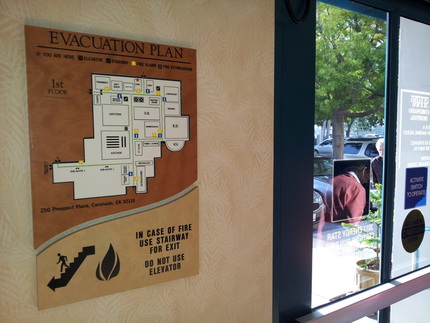 Read the evacuation plan before you run out of the door, please
Read the evacuation plan before you run out of the door, please According to her, it is my fault.
Before hip surgery happens, you have to go to surgery class. This is where several sadistic nurses describe the grim post-operative complications possible, including paralysis, permanent confinement to a wheelchair, and death. This is not one of those "death panels" you hear so much about. It is more of a "heart attack panel," because that it what they are trying to scare you into having, in order to have something to do to you before surgery begins.
We gather at the front of the hospital, a collection of people on crutches, canes or rolling in wheelchairs. They check ID's. I don't know why. Maybe that vast tide of illegal immigrants that everybody worries about is composed of people trying to sneak into hip surgery class. They give us coffee and make us wait. It is only in the last few years that the medical industry has conceded that a patient turning on their cell phone in the hospital will not shut off every pacemaker and close every stent in the building, so most people are on their phones. My beloved reads a newspaper. I look brightly around, searching for amusement, and notice that the hospital has posted its emergency evacuation plan twelve inches from the main entrance. See the picture.
Now really, if a fireball burst out from the nearby corridor, or fumes of pandemic started pumping out of the air conditioners, or entire wards turned into zombies and started drooling for a taste of your flesh, or anything else happened that required you to leave in a hurry, would you stop to make sure you were doing it according to the hospital's plan OR WOULD YOU JUST RUN SCREAMING OUT THE FRONT DOOR?
I know what I would do.
After everyone has gathered, we are told we have to go to the meeting room. This is located as far as possible from the hospital entrance. I am sure the hospital staff does this for their own amusement, and also to make us pay for being allowed to use our cell phones. It's only about four hundred feet, but remember everybody in the group is there because the pain of walking is so bad they would rather sliced open than endure it any more. It is a slow procession. If Moses had been leading these people across the desert, it would have taken eighty years instead of forty; if they had been on the Trail of Tears they would have run out of Kleenex before they'd gotten a quarter-mile.
A youthful nurse now addresses the group of cripples. As she describes the possible brushes with death and the inevitable wall of searing pain each one of the surgery prospects faces, she bounces around, flexing her lithe muscles as if she is barely restraining herself from doing jumping jacks or a quick session of yoga. The surgery patients stare at her dully, their minds fogged by the pain killers they need to get out of bed at all. I stare at her dully, too, because that is the only safe way to stare at a lithe young nurse when I am with my girl.
Next, we learn that there is at least a fifty-fifty chance that all of our noses are full of deadly bacteria just dying to leak out and kill us. Most of the room is horrified, but I console myself with the thought that now I know I am only one socially unacceptable act away from being able to flick death at my enemies.
Then the infection nurse comes in. She is a cheery soul despite her revolting job title. Her job is to convince the patients that if they don't have a relative who is a bubble boy that they can move in with for the next two months, they will probably fail to maintain a sterile enough environment after surgery to prevent their prosthesis from becoming infected and useless, resulting in several additional operations that will probably not help to relieve their agony. We are so used to hearing about the slim chance we have of resuming normal lives after the surgery by now that we barely blink at this news.
On the way back, my girl and I form a plan. Cancel the surgery. Buy a wheelchair. Smuggle morphine in from Mexico for as long as it kills her pain. If we ever want to have sex again, we go for a zero-G space ride like Kate Upton to minimize the chance of further hip damage. Anything to avoid falling into the hands of that hospital.
Then we go see the surgeon, the agent of her impending doom. He blinks when asked to frankly assess her chances of survival. "Everybody's fine in about two weeks," he tells us. "Really. I don't know why anyone would tell you otherwise."
So it's a go. I'll be at her side. If you want to know how it comes out, call me on my cell phone.












 RSS Feed
RSS Feed











